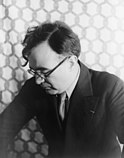The Short Symphony, or Symphony No. 2, is a symphony written by the American composer Aaron Copland from 1931 to 1933. The name derives from its short length of only 15 minutes. The work is dedicated to Copland's friend, the Mexican composer and conductor Carlos Chávez (pictured). The composition contains complex rhythms and polyharmonies, and incorporates the composer's emerging interest in serialism and Mexican music. Copland later arranged the work as a sextet. The symphony was not widely performed during Copland's lifetime, largely due to the piece's rhythmic difficulties. After Serge Koussevitzky and Leopold Stokowski both declined to conduct the premiere, Chávez agreed to deliver it in 1934 in Mexico City. Though Copland thought of the Short Symphony as "one of the best things I ever wrote", some critics found it to be fragmented and cacophonous. Others agreed with Copland's assessment, describing the symphony as a masterpiece and a significant work in both Copland's career and modernist music. (Full article...)
